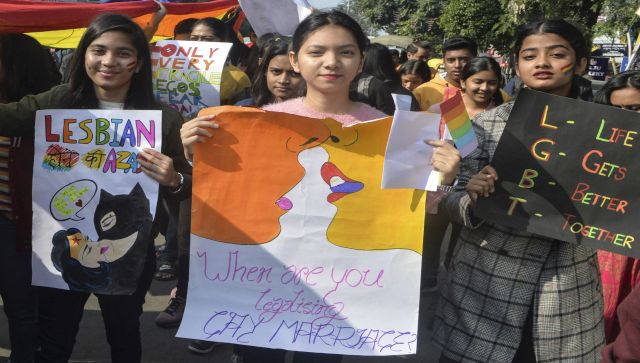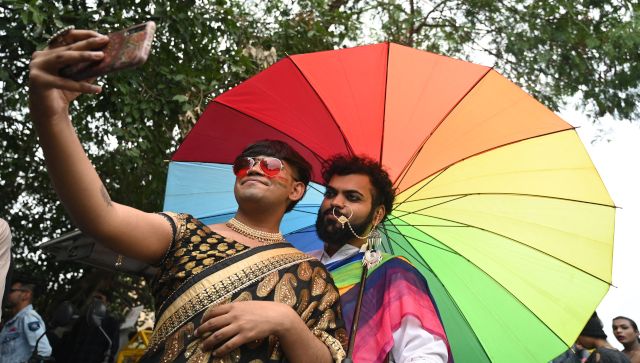A five-judge Supreme Court bench headed by Chief Justice of India DY Chandrachud, on Tuesday delivered its verdict on marriage equality.
The bench comprising the CJI and justices Sanjay Kishan Kaul, S Ravindra Bhat, Hima Kohli and PS Narasimha was hearing a clutch of petitions seeking the legalisation of same-sex marriage.
It will announce four separate verdicts.
Chandrachud, saying it is up to Parliament to change the Special Marriage Act, said the court cannot make law but only act as an interpreter.
In short, the CJI left the issue up to Parliament.
Chandrachud added that it is “incorrect to state that marriage is a static and unchanging institution.” He added that “homosexuality or queerness is not an urban concept or restricted to upper class of society”.
“Whether there is need for change in regime of Special Marriage Act is for the Parliament to decide, CJI Chandrachud said.
“To imagine queer as existing only in urban spaces would be like erasing them, queerness can be regardless of one’s caste or class,” he added.
NDTV quoted the CJI as saying that striking down the Special Marriage Act (SMA) would take the country back to the ‘pre-Independence’ era.
“If the Special Marriage Act (SMA) is struck down, it will take the country to pre-Independence era. If the court takes the second approach and reads words into the SMA, it will be taking up the role of legislature. The court is not equipped to undertake such an exercise of reading meaning into the statute,” CJI Chandrachud said.
“This court must be careful to not enter into the legislative domain,” the CJI added.
Meanwhile, Justice Kaul differed from Justice Bhat’s verdict stating that the SMA was passed only with the aim of allowing heterosexual marriages.
“I have said that the Special Marriage Act is violative of Article 14. However, there are interpretative limitations to including homosexual unions in it. As rightly pointed by the Solicitor General, tinkering with the Special Marriage Act can have a cascading effect,” Kaul added.
But what is the Special Marriage Act? Let’s take a closer look:
What is it?
Marriages in India can be registered under the Hindu Marriage Act, 1955 (HMA) and Muslim Marriage Act, 1954 (MMA), which fall under personal laws, and the Special Marriage Act, 1954 (SMA).
The Special Marriage Act was passed in Parliament on 9 October, 1954. It is the provision which governs civil marriages of people of India and all Indian nationals in foreign countries, irrespective of religion or faith. Under this act, the state sanctions marriage over religion.
Also read: ‘I Do’: Will India become the next country to approve of same-sex marriages?
In India, marriage, divorce, and adoption fall under the ambit of personal law and are governed by religious laws like the Hindu Marriage Act and Muslim Marriage Act, which require the spouse to convert to the religion of the other before marriage.
However, the Special Marriage Act allows marriages between inter-faith and inter-caste couples without conversion.
The Supreme Court was examining if the right to same-sex marriage could be conferred under this Act.

What is a civil union that CJI previously mentioned?
A civil union is a legally recognised union which allows rights similar to that of marriage, created for same-sex couples. It covers employment, inheritance, property and parental rights. However, there are some differences between the two.
But what are the differences between civil union and marriage?
Before the Supreme Court of the United States legalised same-sex marriages across the country in 2015, several American states had civil union laws. While it allowed homosexual couples to marry, it did not provide them a formal recognition of the same.
However, under the civil union, couples could inherit property from spouses, enjoy the employment benefits of their partners, and have rights to joint ownership and joint parenting.
Also read: Homosexuality vs same-sex marriages: India’s one step forward, two steps backwards
The big difference was that civil unions were recognised in the issuing states, which determined their own marriage laws, and not by federal law. This meant that the couples enjoyed the benefits of the partnership only in states that recognised same-sex unions and not across the country.

What is the Supreme Court of India considering?
The speculation was that the Supreme Court might do away with the gender binary under this Act to extend it to same-sex couples.
Some petitions have challenged the provisions of the Hindu Marriage Act and others have asked the court to re-interpret the Special Marriage Act so that it covers same-sex marriage.
“There may be some amount of sage wisdom in also going about our tasks in an incremental manner. Because otherwise do we then confine ourselves only to HMA? What about the Parsis, Jews, Muslims? There are a lot of communities,” the CJI earlier observed.
He was responding to remarks by senior advocate Menaka Guruswamy, representing one of the petitioners, who said that there were concerns with the HMA.
The bench also told the petitioners that since the court is “playing a dialogical role to create a consensus to move towards an equal future,” they should assist it on how “we can develop the notion of a civil union, which finds recognition in SMA”, according to ThePrint.
While debating on the notions of male and female in the Supreme Court, CJI Chandrachud said that “there is no absolute concept” of a man or woman and the postulation is far more complex than categorising a person according to born-with genitals.
He was responding to an argument by the Solicitor General that even in the Special Marriage Act the “legislative intent” of marriage throughout has been a “relationship between a biological man and a biological female”.
The CJI said, “It is a very important value judgment you are making. You are saying that the very notion of a biological man or a biological woman is absolute.”
“Biological man means what genitals he has,” SG Mehta said.
To which Justice Kaul replied, “That is a point of view”.
According to Mehta, several issues are to be “gone into” in the matter. “It is better Parliament debates this.”
“If we are not touching personal law, why should states be heard? We are confining it to SM Act and whether we can read it as a person instead of man and woman,” Justice Kaul said.
The bench had previously indicated that it may only confine to the interpretation of the Special Marriage Act (SMA) to include the term “person” instead of man and woman.
“We are not willing to go into personal law issues. Remit will thus have to be restricted only to the extent we are willing to consider the issue,” it told the counsels appearing for petitioners and respondents, which include the Centre, religious bodies and individuals.
While the government, through Special Solicitor General Tushar Mehta, questioned the maintainability of petitions, the CJI said that the hearing’s scope would be limited to developing a notion of a “civil union” that finds legal recognition under the Special Marriage Act.
With inputs from agencies
Read all the Latest News, Trending News, Cricket News, Bollywood News,
India News and Entertainment News here. Follow us on Facebook, Twitter and Instagram.
from Firstpost India Latest News https://ift.tt/md0Auiw
No comments:
Post a Comment